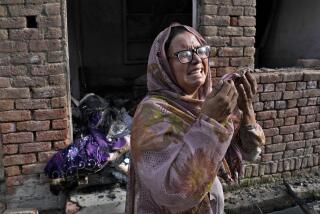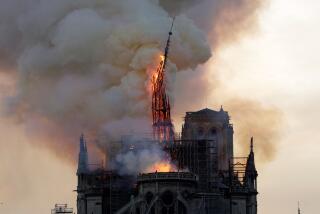ASIA : In Kashmir, India Faces a Political Conflagration
- Share via
NEW DELHI — A group of Kashmiri guerrillas and their gun-toting allies were barricaded inside the Kashmir shrine of a Muslim saint who preached universal tolerance, harmony and love.
“There is one God, but with a hundred names”: Admirers say that simple message was the spiritual touchstone of the patron saint of the beautiful but troubled Himalayan land of Jammu and Kashmir.
About 2 a.m. on May 11, the saint’s mausoleum and green-roofed shrine in the town of Char-e-sharif, where scores of Islamic militants fighting Indian rule had been holed up for two months, went up in flames.
An earlier fire destroyed up to 1,000 homes and shops in the town, 30 miles south of Srinagar. Most of the residents had fled.
And since May 11, more than 170 arson attacks have been reported in the Kashmir Valley as Muslims infuriated by the torching of a holy place target government offices, small Hindu temples and the homes of Hindu Kashmiris who had fled the region.
India blamed local “mercenaries” and their friends and supporters across the border in Pakistan for the frenzy of destruction.
But Pakistan and many Kashmiris blamed only the Indian armed forces, which had formed a cordon around Char-e-sharif since March to prevent the guerrillas holing up in the shrine from being reinforced or supplied.
*
In Pakistan, Prime Minister Benazir Bhutto proclaimed Friday a “black day” so Muslims could mourn the desecration of a holy site by a non-Islamic government. In Kashmir itself on Friday, protesters burned down a bank and taunted police.
Although the cause is still murky, the fire was undeniably a setback for India’s leadership, imperiling its plan to hold state elections--the first in Jammu and Kashmir since 1987--by July 18, when direct rule from New Delhi expires.
“I doubt now whether the election can be held in July,” said V.A. Pai Panandiker, director of the Center for Policy Research, a New Delhi-based think tank.
The blaze and the unprecedented level of anti-India sentiment it sparked in Kashmir, India’s only Muslim-majority state, “threaten to irrevocably alter the course of the six-year-long violent and dogged secessionist movement,” said the respected India Today magazine.
*
For Prime Minister P.V. Narasimha Rao, already politically embattled, the fiasco was doubly dangerous because he had taken personal charge of government actions in Kashmir.
Rao, 73, admitted in Parliament that he had been “overtaken by events.” But he reiterated his commitment to restoring democratically elected government in Kashmir as a way of defusing widespread separatist sentiment.
There are no popularly chosen institutions in the state of 7.7 million people, Rao has noted. In remarks to lawmakers Tuesday, he implied that he would consider anything short of outright azadi --freedom--for Kashmir as long as it can be reconciled with the Indian constitution.
Most of Kashmir’s Muslim political parties have said they would boycott the state elections and demand instead a referendum on whether Kashmir should be part of India or Pakistan, or a separate country.
A third of the former princely state is held by Pakistan, with the rest administered by India. The countries have fought two of their three wars over Kashmir.
Since 1990, the Indian army has been battling Kashmiri separatists in a bloody struggle that human rights activists say has been marked by atrocities on both sides. More than 20,000 people have been killed.
More to Read
Sign up for Essential California
The most important California stories and recommendations in your inbox every morning.
You may occasionally receive promotional content from the Los Angeles Times.













